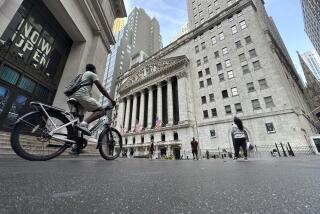Greenspan Warns on Deficits
- Share via
WASHINGTON — Federal Reserve Chairman Alan Greenspan said Thursday that the U.S. economy has borne up surprisingly well under the blows of terror attacks, a stock crash and a sharp retreat in business investment but faces a new threat in looming federal deficits that could raise interest rates.
“Returning to a fiscal climate of continuous large deficits would risk returning to an era of high interest rates, low levels of investment and slower growth of productivity,” Greenspan told the House Budget Committee.
Greenspan said Congress should extend federal spending controls that are widely credited with having helped produce four straight years of budget surpluses but are set to expire at the end of this month.
He sidestepped the politically charged question of whether the need for renewed fiscal restraint required undoing portions of President Bush’s 10-year, $1.6-trillion tax cut, which Congress approved last year. He also declined to speculate on the economic cost of a protracted war with Iraq.
Greenspan’s nearly exclusive focus on the budget in congressional testimony Thursday surprised some listeners, who had expected him to offer some account of the economy’s condition and a hint about whether the Fed planned further interest rate cuts any time soon.
But the central bank chairman only tipped his hat to the subject, saying, “The economy appears to have withstood [recent] blows well, although the depressing effects still linger.”
Analysts said Greenspan’s minimal comments suggested that Fed policymakers were unlikely to change the central bank’s signal-sending federal funds rate at their Sept. 24 meeting. The rate is already at a 40-year low of 1.75%.
“They’re unlikely to act soon,” said Peter E. Kretzmer, an economist with Banc of America Securities in New York.
Stock prices tumbled and bond prices rose after Greenspan’s testimony, as well as President Bush’s United Nations speech on Iraq and news that initial jobless claims have risen to a near-five-month high of 426,000.
The Dow Jones industrial average tumbled 201.76 points, or 2.4%, to close at 8,379.41, while the broader Standard & Poor’s 500 index dropped 22.54, or 2.5%, to 886.91 and the tech-heavy Nasdaq composite index skidded 35.77, or 2.7%, to 1,279.68. The price of a bellwether 10-year U.S. Treasury note climbed, sending its market interest rate to 3.96%, a 39-year low.
On its face, Greenspan’s call for maintaining formal budget controls seemed unsurprising.
The Congressional Budget Office predicted last month that Washington would run a $157-billion deficit this fiscal year--the first since 1997--and a nearly half- trillion-dollar deficit in this and the next three years. With only two weeks left in the current fiscal year, Congress’ effort to agree on a spending plan for the coming 12 months is in tatters.
But Greenspan’s comments provoked some ire among Democrats and independent analysts, who noted that the Fed chairman previously endorsed the idea of using tax cuts to reduce the surplus. The endorsement helped pave the way for congressional approval of Bush’s tax cuts.
Greenspan also sparked criticism by repeating arguments made in a speech last month in Jackson Hole, Wyo., that the Fed was largely powerless to stop or pop the stock bubble of the late 1990s.
More to Read
Get the L.A. Times Politics newsletter
Deeply reported insights into legislation, politics and policy from Sacramento, Washington and beyond. In your inbox twice per week.
You may occasionally receive promotional content from the Los Angeles Times.










